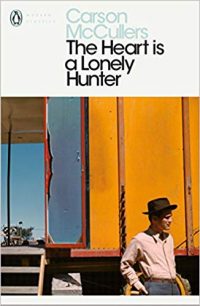A fellow can’t live without giving his passive acceptance to meanness
 The Heart is a Lonely Hunter
The Heart is a Lonely Hunter
by Carson McCullers
This is a beautiful, devastating novel that explores loneliness and poverty. It starts quietly and builds to an angry climax. I can’t quite fully believe that Carson McCullers was only 23 when she wrote this.
Set in a small mill town in 1930s Georgia, the plot revolves around John Singer, a deaf man who touches the lives of several others. He has a job at a jeweller, is educated (including knowing sign language) and serenely gets on with his life. After his deaf friend and room mate Spiros Antonapoulos is taken away to an asylum, some of the town’s more disaffected residents begin to notice Singer, turning to him as a confidante.
This group includes Mick Kelly, a tomboyish teen girl who is developing a deep love for music, though her family can’t afford for her to pursue this love beyond listening to other people’s radios. She tries to describe music to Singer in a way that is so moving that it doesn’t seem strange.
“Then the music started. Mick raised her head and her fist went up to her throat. How did it come?…Like a walk or a march. Like God strutting in the night. The outside of her was frozen and only that first part of the music was hot inside her heart…After a while the music came again, harder and loud. It didn’t have anything to do with God. This was her, Mick Kelly…the real plain her.”
There’s Jake Blount, a newcomer to town, an alcoholic general labourer with radical political ideas and a great deal of frustration that he can’t make himself understood. He makes an interesting contrast with Dr Benedict Mady Copeland, a black doctor who is well respected among the town’s black residents. Dr Copeland reveres Karl Marx and is deeply frustrated that he has got old without having achieved anything in his aim to improve the position of black people in America.
Finally, there’s Biff Brannon, who runs the local bar and diner where Singer eats most days. He is in a loveless marriage, feeling no attraction to his wife (though he does, problematically, have an unspecified attraction to underage Mick). Like Singer, Biff observes other people more than he communicates himself, but like all Singer’s hangers-on he fails to notice that Singer is desperately lonely and in need of someone to listen to him (so to speak – he is described as mute).
“Jake drank from the bottle… ‘I read. I read all the time. I read books that tell the pure honest truth. Over there in that suitcase I have books by Karl Marx and Thorstein Veblen and such writers as them. I read them over and over, and the more I study the madder I get…Wherever you look there’s meanness and corruption. This room, this grape wine, these fruits in the basket, are all products of profit and loss. A fellow can’t live without giving his passive acceptance to meanness. Somebody wears his tail to a frazzle for every mouthful we eat and every stitch we wear’.”
All of these people come to ascribe Singer with almost supernatural qualities, failing to see him as human. They have all forgotten Antonapoulos and don’t understand (or ask) where Singer goes on his trips to the far-off asylum. There are some veiled suggestions that Singer and Antonapoulos may have been more than just friends, but even with him, Singer never really receives the human connection that he craves.
The novel starts with gentle humour and ends with anger. There is pathos from the start, but the narrative never judges its characters. Considering when it was written, it is perhaps surprising how well McCullers seems to empathise with and voice the thoughts of people who are old, poor, Communist, black, Jewish, possibly gay, probably paedophilic. That said, it’s hard not to notice that the dialogue of all black characters other than Dr Copeland is written in a dialect that feels caricatured at best, and there is liberal use of the N word. (Though it’s always in dialogue, which I guess is probably an accurate representation of 1930s vocabulary, the novel includes a black character saying outright that its use is racist, so why use it?)
So it’s not perfect, and McCullers’ youthful liberal zeal is at times misplaced, but this is a beautifully written book. Its real strength is communicating the reality of poverty, how people can exist on a knife edge between a comfortable life and losing everything, the deep frustration of anyone who sees the unfairness on which so much of western society is based. But it also really is about loneliness, no matter how many essays I read trying to argue otherwise.
First published 1940.
Source: Christmas present from my sister.